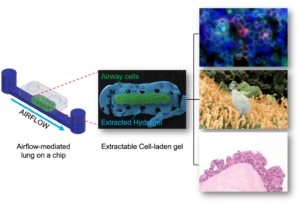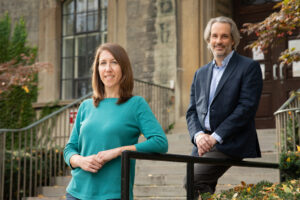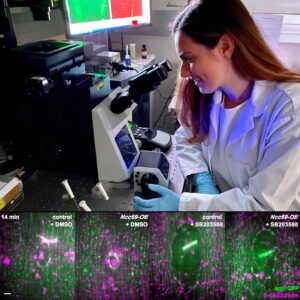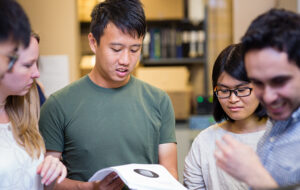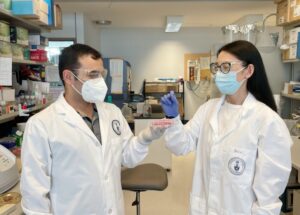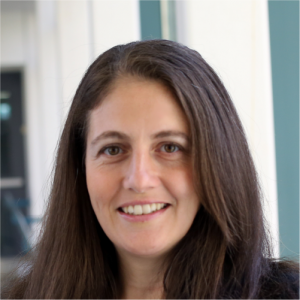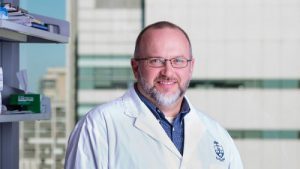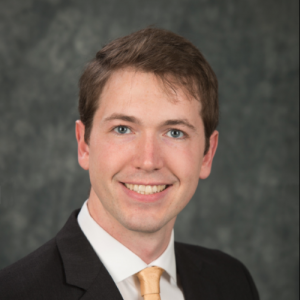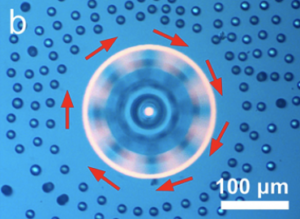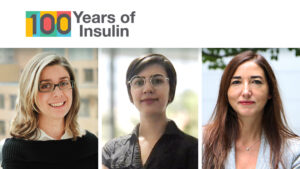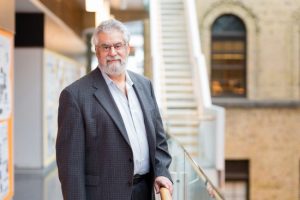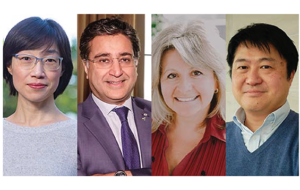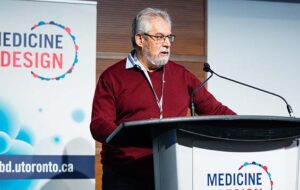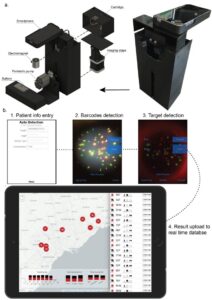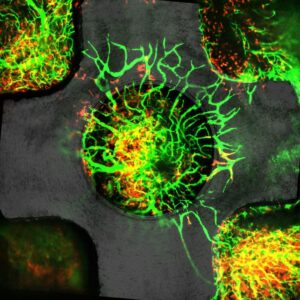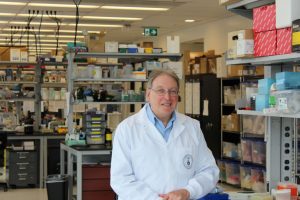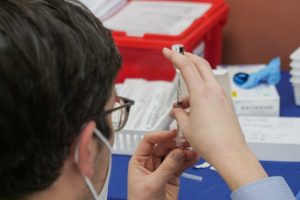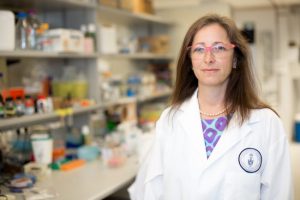Research News and Stories
Explore the latest news, stories, and groundbreaking research happening at the Institute of Biomedical Engineering. Stay updated on innovative projects, impactful discoveries, and the achievements of our talented students, faculty, and alumni shaping the future of biomedical science and engineering.
Quick Navigation
New microfluidic device could become a useful tool to examine the effect of pollutants on the lung
A new technology developed by researchers at the University of Toronto provides the first step in mimicking the environment of lung airways, enables scientists to perform particle exposure experiments to examine the pathological effect of air pollutants on respiratory health.
What Sits at the Centre of Wound Healing?
The science of rapid wound healing has new insights due to discoveries in fruit flies from the Fernandez-Gonzalez lab at University of Toronto. Collaboration, community and perseverance has resulted in an article published in the journal Cell Reports as “p38-mediated cell growth and survival drive rapid embryonic wound repair”.
Medicine by Design and partners invite trainees to explore entrepreneurship through enhanced Building a Biotech Venture program
Building a Biotech Venture, a trainee entrepreneurship program, is going into its second year with expanded education and support for trainees who are thinking about taking their first steps toward building their research into a product or venture.
New Medicine by Design-funded method for testing muscle repair in a dish to impact development of stem cell-based therapies
Scientists out of two labs at the University of Toronto have discovered a novel way to test self-repair of skeletal muscle, and this method has the potential to rapidly advance the development of treatments for diseases like muscular dystrophy (MD) and other degenerative muscle conditions.
UHN’s Ajmera Transplant Centre collaborating with U of T’s Medicine by Design
UHN thoracic surgeon Dr. Tom Waddell led the first session of “Regen Med in the Clinic” with University of Toronto researcher Alison McGuigan, talking to fellows about a respiratory condition from surgical and engineering perspectives.
Dr. Craig Simmons named BMES Fellow of 2021
Professor Craig Simmons was inducted as a Biomedical Engineering Society (BMES) fellow among 19 other internationally recognized scientists and engineers. As a BMES fellow, Dr. Simmons was recognized internationally for his innovative and wide-ranging contributions to both fundamental science and practical applications in the field of mechanobiology.
Daniel Franklin assumes key role as Ted Rogers Chair in Cardiovascular Engineering
Daniel Franklin, a rising star in the field of wearable sensors and implantable medical devices, has been appointed the first-ever Ted Rogers Chair in Cardiovascular Engineering.
Dr. Alex Mihalidis named Fellows of the Canadian Academy of Health Sciences
Dr. Alex Mihailidis was one of fifteen University of Toronto researchers to be named Fellows of the Canadian Academy of Health Sciences in recognition of their “dedication and excellence.”
Wheeler Group introduces light-driven micromachines powered by optoelectronic tweezers
In a study published this week in Nature Communications, research from Professor Aaron Wheeler has introduced reconfigurable multi-component micromachines driven by optoelectronic tweezers.
Putting Down Roots
Drs. Cristina Nostro and Sara Nunes Vasconcelos, with their postdoctoral fellow Dr. Yasaman Aghazadeh, have engineered a new method to improve the survival and potency of such cell transplants.
Optimizing patient prioritization for admission to rehab among four projects powered by Connaught New Researcher awards
Leo Chou is one of the FASE faculty members who received Connaught New Researcher Awards this year.
Medicine by Design’s Pivotal Experiment Fund invests $1 million in four research teams to bridge the “valley of death” funding gap
Four researchers leading teams that are sharing $1 million in funding through the Pivotal Experiment Fund.
Dr. Omar Khan discuses Delta variant concerns being raised as Canada with Sonia Deol on Global News
Dr. Omar Khan discuses Delta variant concerns being raised as Canada with Sonia Deol on Global News.
Medicine by Design’s executive director launches new chapter in diabetes research with JDRF grant
Dr. Michael Sefton had received ~ $430,000 JDRF grant to continue to study if cells found in the skin can play a key role in enabling stem cell transplants for diabetes.
Four BME faculty promoted to associate professor
Drs. Kei Masani, Sarah Vasconcelos, Sowmya Viswanathan, and Azadeh Yadollahi were both promoted to Associate Professor at the Institute of Biomedical Engineering (BME). This promotion was based on their research excellence, teaching mandates, and community- based contributions.
Researchers develop a quantum dot smartphone device to diagnose and track COVID-19
Researchers at the University of Toronto (Institute of Biomedical Engineering, Department of Chemistry, Donnelly Centre for Biomolecular Research) in collaboration with Sunnybrook Health Sciences Centre, Public Health Ontario, and Mt. Sinai Hospital have engineered a diagnostic test with a smartphone reader to surveil and track COVID-19 patients.
An innovative approach to visualize the peri-implant healing process at single-cell resolution
In a recent study, researchers from the University of Toronto employed a unique state-of-the-art imaging technique for deep tissue imaging, that has enabled the monitoring of peri-implant bony healing biology in action. This technology can lead to a better understanding of the healing process, allowing researchers to leverage this knowledge to develop faster therapeutic approaches with the use of biomaterials for the future.
New method can improve drug delivery in implants
An innovative biomaterial discovery by researchers at the University of Toronto in collaboration with Ripple Therapeutics Inc., has established a method that yields better control over drug release profiles in implants and has the potential to disrupt the classical drug delivery market.
A helping hand for neurorehabilitation
Dr. Jose Zariffa and his research team are developing tools that enable clinicians to evaluate rehabilitation success and track recovery. The goal is to create a personalized process for the improvement of rehabilitation from spinal cord injuries and stroke, accelerating the affected individuals back on the road to recovery.
Explainer: U of T Engineering professor Omar F. Khan on COVID-19 vaccination efficacy, misconceptions and Canada’s rollout
As Canada races to vaccinate its citizens amid an increase in variant infections, writer Liz Do spoke to Professor Omar F. Khan (BME), an immunoengineering expert. Khan, whose lab designs nanotechnology devices that can deliver RNA technology to cells for better disease treatment, explains common concerns and questions around COVID-19 vaccines.
‘The next big step’: U of T researchers pursue a treatment for vision loss
Supported by U of T’s Medicine by Design initiative, a multidisciplinary team led by University Professor Molly Shoichet (ChemE, BME, Donnely) plans to use retinal stem cells to restore vision.
U of T researchers develop a new tool for scooping contents of individual cells from their local environment
Scientists can now select individual cells from a population that grows on the surface of a laboratory dish and study their molecular contents. Developed by U of T researchers, the new tool will enable a deeper study of stem cells and other rare cell types for therapy development.
